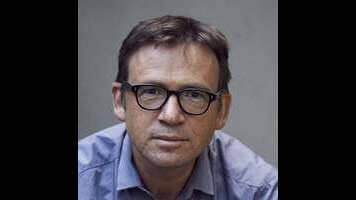David Nicholls’ novel One Day (which was much, much better than the movie) traces the developing relationship between a man and a woman over a series of several years, focusing on a single day at a time. For his follow-up, Nicholls returns to the long-term relationship well, as Douglas describes his decades-long marriage to Connie, who has just told him that she thinks she wants a divorce. Unfortunately, she tells him this right before a big European trip with their son, and the couple agrees to try to put any divorce talk on hold until after the trip. As Douglas puts it, “And so the condemned man, presented with his final meal, is reminded that at least the cheesecake is delicious.”
Douglas is an introverted scientist, Connie a vivacious and effervescent artist, their college-bound son Albie an appropriate combination of both. So it’s surprising that Nicholls would make his first-person narrator here the least-compelling character in the trio. Douglas is not only shy, but occasionally petulant. He describes events like a tryst between Douglas and Connie in their Parisian hotel room in an awkward manner: “Afterwards we lay in a tangle of limbs. ‘A tangle of limbs.’ Where did I get that from? Perhaps one of the novels that Connie encourages me to read.” Douglas musing about his own attempt to pull off a captivating description is meta enough to take us right off the page. And his fumbling attempts at train conversation or his clear efforts to pick a fight with his son make the reader believe that Connie may be on to something with her desire to flee her marriage.
Fortunately, Nicholls offers an inventive (and only slightly confusing) narrative structure: He juxtaposes the family’s European vacation with scenes from Douglas and Connie’s courtship, with Douglas ruminating about those early relationship days when the couple doesn’t leave their flat for the whole weekend and can barely bear to be separated for a single night. (Mid-novel, Douglas unhelpfully points out, “But I am going backwards and forwards simultaneously,” after he’s been doing so for at least 100 pages.) It’s a worthwhile exploration: How do those fizzy days of complete infatuation eventually turn into humdrum domesticity? The passing of twentysome years helps, as Douglas details rough events the couple had to endure with fertility troubles, ailing parents, and moving out of London.
Nicholls offers another nice allegory with a touristy exploration of Europe set up against this touristy exploration of a marriage: Because what is marriage if not negotiating accommodations and traveling through strange countries together? As Douglas puts it:
There are ravines and great jagged peaks and hidden crevasses that send the both of you scrabbling into darkness. Then there are dull, parched stretches that you feel will never end, and much of the journey is in fraught silence, and sometimes you can’t see the other person at all, sometimes they drift off very far away from you, quite out of sight, and the journey is hard. It is just very, very hard.
Lyrical patches like these, although fun to read, don’t match up to our image of our main character/narrator, who is painted to be a rather bumbling, ineloquent speaker. In the end Douglas and Connie try to define what it means to be in this type of long-term relationship; if it ends, was it all just a waste? And if it is, what does that mean for all the years they spent together? The juxtaposition of the journey both into Europe and through the couple’s earlier years works as we navigate these unfamiliar territories, whether Nicholls is describing an Amsterdam gallery or a bohemian London apartment. If only he had offered us a more interesting tour guide.

